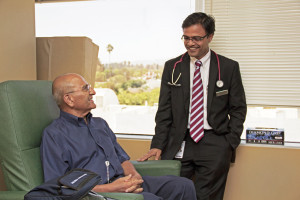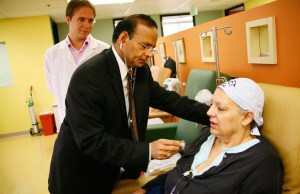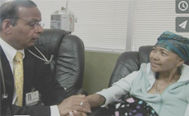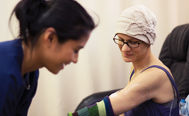Melanoma
“It does not matter how slowly you go so long as you do not stop.”
Andy Warhol, Artist
Melanoma Overview
 Melanoma is a form of skin cancer caused by overexposure to the sun, and while it’s considered the more serious of the two types of skin cancer, melanoma can be successfully treated at an early stage of the disease.
Melanoma is a form of skin cancer caused by overexposure to the sun, and while it’s considered the more serious of the two types of skin cancer, melanoma can be successfully treated at an early stage of the disease.
Melanoma typically develops in heavily pigmented skin such as a birthmark, mole, or dark freckle and usually appears in adults age 45 and older, but it can develop in younger adults. The disease typically develops in the extremities (legs, arms), chest or back but it can also be found on the sole of the foot or palm of the hand. In appearance, melanoma manifests as a flat irregular mole colored black, brown, or a combination of the two. The best protection against melanoma is sunscreen and protective clothing. Individuals with fair skin or a family history of melanoma are at a greater risk of developing the condition.
Symptoms & Diagnosis
While effective sun protection is the best defense against this skin cancer, attention to the signs and symptoms of melanoma can help towards an early diagnosis. There are specific physical features to melanoma and checking for the following characteristics is recommended:
- Asymmetry – irregular shape
- Border irregular – edges of the growth are notched or ragged
- Color – irregular coloration
- Diameter – size greater than 6mm (pencil eraser)
- Evolution – change in shape, color, or surface
If the melanoma has spread to another part of the body, symptoms will then include swollen lymph nodes, usually in the groin or armpit, or a colorless lump or thickening under the skin.
If you have experienced any recent physical changes that could indicate melanoma, you must consult a physician to discuss your skin cancer symptoms. You are welcomed to contact the our Los Angeles surgical center to schedule a consultation with one of our highly qualified physicians. We would like to help you and discuss any questions that you might have regarding your health.
Treatment Methods
In its early stage, melanoma affects only the skin and responds well to chemotherapy or another less invasive treatment. However, once it spreads, more advanced methods are required and can include a combination of several treatments including:
- Surgery – The entire melanoma and surrounding area is removed
- Chemotherapy – used to stop or slow the growth
- Immunotherapy – medicines used in conjunction with natural immune system
 Metastatic melanoma is usually treated with a combination of two or more modalities such as surgery and chemotherapy, immunotherahpy, or radiation therapy. If you are diagnosed with melanoma, you must discuss all treatment options with your doctor and ask questions if you need more information when considering treatment options.
Metastatic melanoma is usually treated with a combination of two or more modalities such as surgery and chemotherapy, immunotherahpy, or radiation therapy. If you are diagnosed with melanoma, you must discuss all treatment options with your doctor and ask questions if you need more information when considering treatment options.
Regular follow-up appointments are important after you have been diagnosed with melanoma. Your doctor will set up a regular schedule of checkups that will happen less often as time goes on.
At the Cancer Center of Southern California, we’ve helped many patients through treatment to recovery. Our physicians and staff partner with patients throughout treatment encouraging them to participate in the decision making process. Our physicians are dedicated to their work in life-saving skin cancer treatments and through their research, have access to the most advanced therapies on behalf of their patients.
Clinical Trials
The Cancer Center actively participates in clinical trials of novel drug therapies, which are made available to patients whenever needed. Our physicians have led advanced clincial cancer research and conducted groundbreaking work in various malignancies including melanoma.
More information about melamona can be found at WebMD.com.
Contact the Oncology Experts for More Information
If you have been recently diagnosed with skin cancer or seek a second opinion, the our oncology specialized team of medical specialists, such as Dr. Sant P Chawla, M.D., director for the Cancer Center, is dedicated to the best possible solution against skin cancer. We are dedicated to our patients’ physical and emotional well-being and committed to helping them against cancer. If you have questions or would like to know more about treatment options, please contact our center today at 310-552-9999 and schedule a consultation with one of our Los Angeles physicians.
Next, read about sarcomas.



